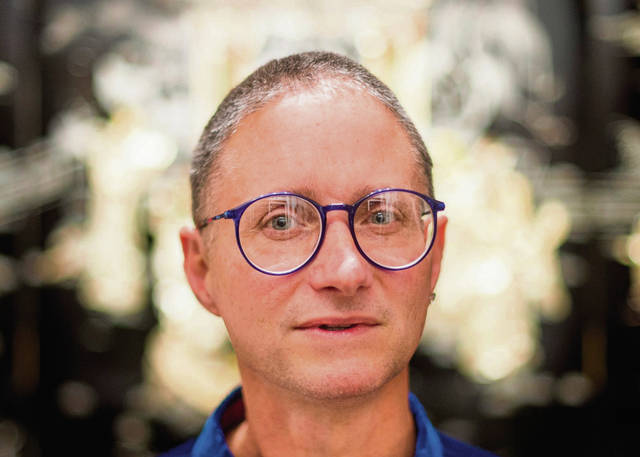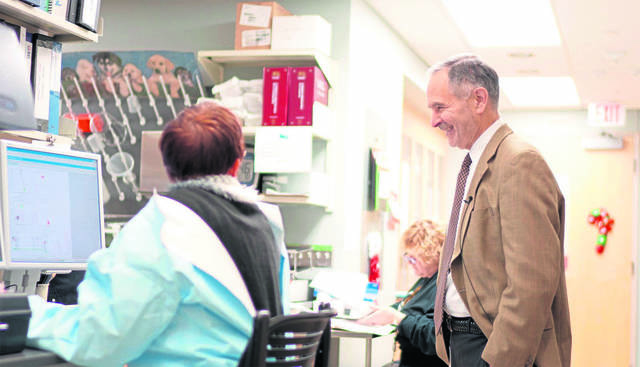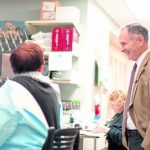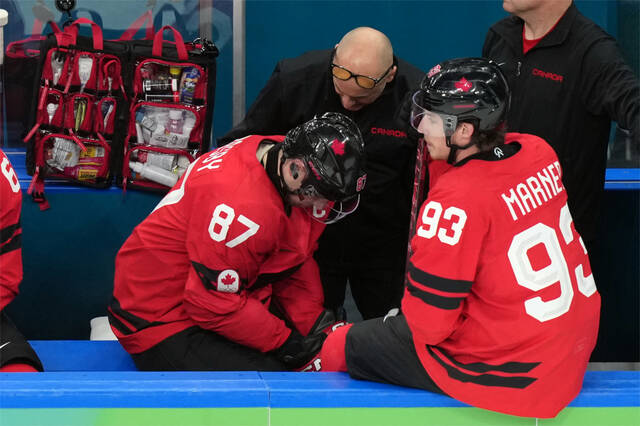When drug makers solicited volunteers to test a coronavirus vaccines, Marc Wagner jumped.
It was a matter of giving back.
“I never thought I would outlive a number of my relatives my age or younger,” said the 58-year-old Swissvale resident. “And here I am, still alive.”
Wagner felt compelled to do his part for science. But just as important, it was an opportunity for him to honor the herculean efforts of scientists and others he has met over the last 35 years in his battle against HIV.
As he made final arrangements for the annual remembrance service the community advisory board of the Pitt Men’s Study hosts every year on Dec. 1, World AIDS Day, Wager got news that the Oxford-AstraZeneca study he is participating in had proven its covid-19 vaccine to be up to 90% effective.
The news was encouraging, but it hasn’t distracted from the event he and other members of the Men’s Study community consider an important duty: honoring those who have given their lives over to the HIV/AIDS study.
Wagner is among some 2,000 men who volunteered for the study in the 1980s and 90s. About 500 surviving volunteers continue to show up faithfully at Pitt twice a year to provide blood and bodily fluids in the quest for a cure for HIV/AIDS. The Pitt Men’s Study is one of the nation’s longest running scientific research studies.
The University of Pittsburgh is among several centers nationwide in the ongoing Multi-Center AIDS Cohort Study. The federally funded study, funded through 2026, has been the foundation for more than 1,700 papers that have advanced the understanding and treatment of illness.
Honoring the Pitt Men’s Study volunteers, many of whom came forward when HIV/AIDS was a death sentence and some of whom have since died, is a sacred honor, said Charles Rinaldo, a Ph.D. scientist who has led the effort at Pitt for nearly 40 years.
“We could not do it without these men,” said Rinaldo, chairman and professor of Infectious Diseases and Microbiology in Pitt’s Graduate School of Public Health. “For over 30 years, they’ve been coming back religiously. These men are dedicated.”
Their participation over decades has allowed the study to focus, among other things, on the impact of HIV/AIDS in aging.
Rinaldo and his staff have gathered for years with members of the Men’s Study community at Heinz Chapel on Pitt’s Oakland campus to observe a solemn evening of remembrance on World AIDS Day. This year, because of the coronavirus pandemic, a virtual remembrance will be conducted online beginning at 7 p.m. Tuesday.
This year’s service will pay tribute to August “Buzz” Pusateri, a community activist and long-term HIV survivor who died last spring. Pusateri, one of the earliest participants in the Pitt Men’s Study, played a critical role in persuading others to join the effort.
Wagner said Pusateri, one of the founding members of the Men’s Study Community Advisory Board, became a role model for younger members of the community.
“Buzz got it across to the community … that this had to be done for them to defeat this epidemic of AIDS,” Rinaldo told the Tribune-Review when Pusateri died in May. He was 81.
Inspired by what he experienced at Pitt, Wagner became a medical technician. Although he has no academic degrees, he has worked in offices and labs at Pitt, Carnegie Mellon and the University of Pennsylvania on projects varying from breast cancer to Alzheimer’s disease. In September, he was credited as a co-author on a peer-reviewed article in the journal Nature Methods on the impacts of HIV in the brain.
He said he decided to participate in the coronavirus vaccine study in part because people with HIV are a unique population that should be represented among such studies. After all, others stepped forward over the years as part of the Men’s Study, and related research projects led to the breakthrough treatments that have allowed him to live with HIV for decades.
While scientists have yet to perfect a vaccine for the vexing HIV retrovirus, the race for a coronavirus vaccine is moving quickly.
The Oxford-AstraZeneca vaccine, one of at least three so far to show promise in human trials, was halted after reports of an adverse side effect in a volunteer. It restarted when researchers deemed the vaccine safe. Now, those overseeing the trial admit that the strongest efficacy — the 90% block among those given a half-dose on their second shot, compared to those given a full dose on the second shot — was an accident. Both groups were to have received the same full dose. Now they’re talking about running yet another trial.
Wagner, who has yet to receive his second dose, isn’t sure he received the vaccine or a placebo.
“I’m hoping I actually got the vaccine,” he said. “I’m pretty confident I did, given the reaction I did. … After I get the booster, I’ll know.”











